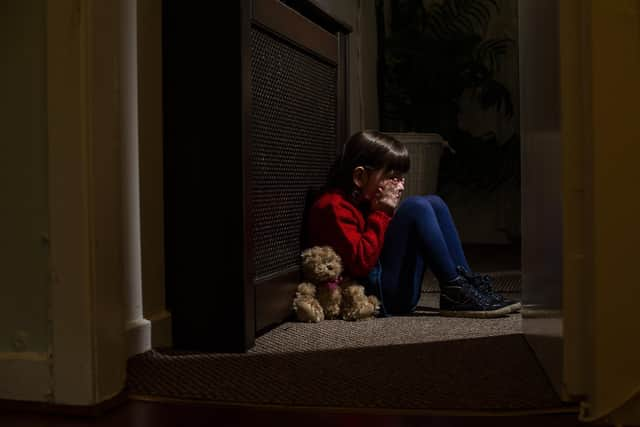Scottish elections 2021: Babies born during the Covid pandemic are at greater risk of lasting mental health problems – NSPCC Scotland
It’s easy to overlook or dismiss the needs of young children; we can often assume they’re too young to remember. But the foundations for lifelong health and well-being are shaped by our early experiences and so it is crucial we pay attention to this fundamental stage of childhood.
A baby’s healthy development depends entirely on the relationships around them. Babies need consistent, safe and nurturing care-giving relationships. When these relationships are unpredictable or not attuned to a baby’s needs, difficulties can arise.
Advertisement
Hide AdAdvertisement
Hide AdInfants are particularly vulnerable to mental and physical harm because they are at a critical stage in their development, completely dependent on adults for their care, and unable to voice their needs or seek support. What happens during these early days of a little one’s life can have profound and lasting impacts on their health.
Yet, when new parents experience challenges, it can inhibit their ability to be the parent they want to be. We know that when parents are overloaded by difficulties, coping with the needs of very young children can be a struggle and have a significant effect on mental health.
Before the pandemic began, up to one in five mothers were experiencing mental health problems during pregnancy and in the first year of their baby’s life. If undetected and untreated, this can have a devastating impact on the mother but can also affect their relationship with their baby.
Research undertaken during the past year has underlined how closely attuned a young child’s mental and emotional well-being is with that of their parents, in turn highlighting the detrimental impact of the pandemic on infants.


A UK-wide survey by the Parent-Infant Foundation, Best Beginnings and Home Start found that six in 10 new parents had significant concerns about their mental health and a third of parents reported that interaction with their child had changed. Also, a Public Health Scotland survey found a clear association between a child’s well-being and their parents’ mental and emotional health during the lockdown period.
So, while our minds are turned to recovery, it is crucial we do not miss the latent effects of the pandemic; the potentially devastating and long-lasting impacts upon our infants. And it is for this reason that we at the NSPCC are taking a stand to give our youngest members of society a voice, so that their lives are not indelibly shaped by Covid-19.
Over the last 10 years, there has been a wealth of evidence about the importance of children’s early years and a raft of policy development aimed at early intervention. But, a decade on from Campbell Christie’s report, which called for a radical shake-up in public services, grounded in prevention, how well do we serve infants and their families in Scotland today?
Last year in Scotland, around half of the children on the child protection register, and over a third of children coming into the care system, were younger than five years old. We know from our research that infant mental health services – services which support children’s development through the parent-infant relationship – are almost non-existent in Scotland. There is much still to do to get it right for every baby in the country.
Advertisement
Hide AdAdvertisement
Hide AdWe are calling on the next Scottish government to transform early childhood, ensuring that young children’s social and emotional well-being is a priority. We believe that substantial investment in public services – universal and specialist – is crucial so all parents in Scotland are supported to give their children the best start in life.
This investment must be guided by an assessment of need in Scotland, to give a true picture of infancy across the country and where there are gaps in support or systems which need to change.
We believe that investing in early years is the most efficient and cost-effective way to realise Scotland’s long-held aspirations around equality. By focusing on early childhood we can address inequalities by preventing harm and changing life trajectories, ensuring that every child receives nurturing care and thrives, not just survives.
This approach is vital if we are going to honour the incorporation of the United Nations’ Convention on the Rights of the Child into Scots law and make Scotland a nation where the rights of every child are recognised, respected and fulfilled.
Just before the pandemic began, the Independent Care Review set out its vision of making intensive family support available to all who need it. And the review’s Promise report sets out a blueprint of how this should be done.
We are urging all of Scotland’s political parties to commit to embracing this challenge so that, following the elections next month, we can press ahead in transforming early childhood across the country and ensure that no family falls through the cracks.
On Monday, NSPCC Scotland, supported by Children in Scotland, will host a virtual hustings to give those working with very young children and families the chance to ask politicians about their plans for the early years if they are elected next month. Representatives from across the political spectrum will be taking part, including the Minister for Children and Young People, Maree Todd.
To join the event click here
Joanna Barrett is associate head of policy (devolved nations) at NSPCC Scotland
A message from the Editor:
Thank you for reading this article. We're more reliant on your support than ever as the shift in consumer habits brought about by coronavirus impacts our advertisers.
If you haven't already, please consider supporting our trusted, fact-checked journalism by taking out a digital subscription.
Comments
Want to join the conversation? Please or to comment on this article.